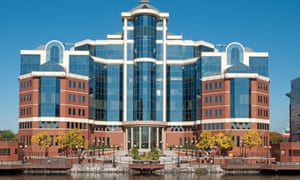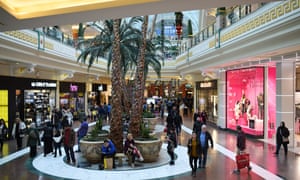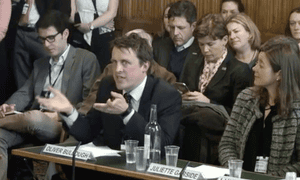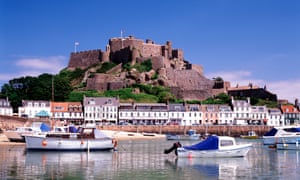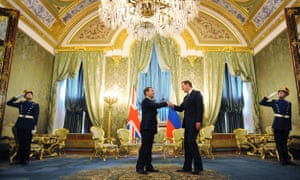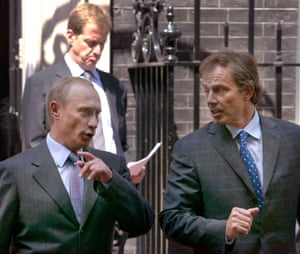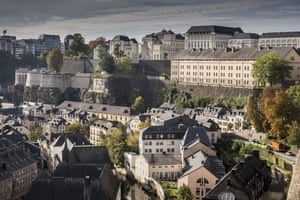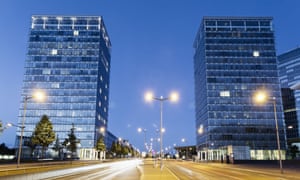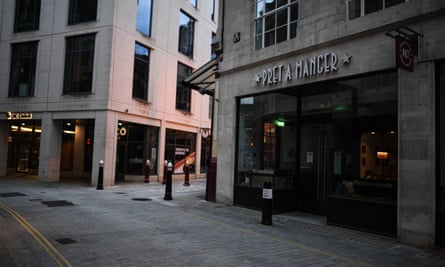
‘Nobody can think that risking their health to save a multimillion-pound sandwich chain is a sensible endeavour.’ Photograph: Peter Summers/Getty Images
With a deadly virus smaller than a speck of dust still circulating, it’s natural that many office workers would rather be doing their jobs from home. Though this inadvertent mass experiment in home working hasn’t been universally enjoyable, particularly for those living in cramped accommodation or juggling work and children, it has at least freed many from commuting, allowed some to spend more time in their local communities, and made cities less congested as a result.
But this isn’t what you’d think from the censorius press coverage of home working, which has treated it as a collective sickness that is stalling Britain’s recovery. Last week, the Daily Telegraph ran a piece stating that workers remaining at home will be more vulnerable to redundancy, with bosses finding it far easier to hand P45s to employees they haven’t seen during the pandemic. Its language was telling: people must “go back to work”, as if they are not already working.
An article in the Daily Mail reprimanded office workers for “boasting smugly about their exciting new ‘work/life balance’ and the amount of money they are saving on their railway season tickets”, as if these were morally reprehensible acts. “If your job can be done from home it can be done from abroad, where wages are lower”, TV presenter Kirstie Allsopp warned on Twitter, adding: “if I had an office job I’d want to be first in the queue to get back to work and prove my worth”. The meaning of these veiled threats is clear: if you stay at home, expect to lose your job.
Beneath this scolding is a message directed at those who aren’t complying with the old status quo. The service economy in financialised city centres depends on the consumption patterns of office workers: commuting every day involves not just buying a sandwich or a coffee from Pret, but helping to prop up an entire system. Were it not for the vast numbers flowing out of stations every morning, the capacity to extract astronomical rents, both from commercial and residential properties, would shrivel – and city centres would no longer be soulless corporate landscapes where multiple franchises of the same chain restaurant can be found within walking distance of each other.
Warnings from the CBI that city centres could become “ghost towns” if commuters never return belie reality: these have long been sterile places devoid of character – it’s just that in the past, it seemed unlikely they might change.
A recent YouGov poll gauging enthusiasm for this back-to-work mantra found that support for workplaces “encouraging [workers] to return to the office” correlated with age: 44% of over-65s agreed with this statement, while only 25% of 25- to 49-year-olds did so. That the over-65s, the age group least likely to be returning to the office, are the most enthusiastic supporters of this principle is unsurprising. The idea that you’ve got to be physically present to prove your value to your boss encodes an entire attitude to work – one firmly rooted in the Taylorist management doctrine of the 20th century, when employees were expected to conform to the objectives of the firm in exchange for a permanent contract. Today, the expectation of worker “flexibility” is more widespread, and surveillance that once relied on office overseers can now be conducted online (indeed, since the start of the pandemic, the demand for software that monitors workers while they’re working from home has surged).
Despite the media paranoia over home working, many managers don’t really seem to care that people aren’t back in the office. Some companies have said they will move to remote working full time, or at least allow employees to work this way some of the time. The people who seem most concerned about going back to work aren’t workers, or managers, but rentiers – a category that applies to many retiree readers of the Daily Mail and the Telegraph, a demographic that is likely to have paid off mortgages, receives generous pensions and contains a higher proportion of private landlords, and to the rentiers who have funneled their wealth into assets such as real estate and office spaces concentrated in urban centres. Until recently, both of these groups were relatively insulated from economic shocks affecting the labour market, their wealth dependent on the continuation of an old normal that now seems more precarious than ever.
The monstering of home working doesn’t really stem from concern about workers’ productivity or mental wellbeing. Instead it’s an attack on those who dare flout the rules that sustained the old normal. The survival of city centres, and by extension the businesses that extract rent from them, relies upon everyone playing their part – most of all workers. Telling people they must return to the office whatever the circumstances is a way to circumvent critique and insist upon the old normal returning, as if repeating a mantra were all it took to make it true.
When newspapers shriek that workers must return to the office, despite the reality that many don’t want to, they’re voicing what the sociologist Luc Boltanski called a “system of confirmation” – an utterance that is neither truth nor fact, but rather a way of reinforcing the status quo. But nobody can think that risking their health to save a multimillion pound sandwich chain is a sensible endeavour.
Since the pandemic began, societal changes that were supposed to be impossible have happened with relative ease. Workers were sent home overnight, and it now seems that many can do their jobs, if not fully remotely, then at least partially from home. Already, many people are talking of moving away from big cities to avoid the costs of high rent and long commuting times. And behind the claims of economic catastrophe caused by a drop in commuting, some independent businesses have reported that they are thriving. Instead of asking what will happen to city centres if the commuters never returned, we should be asking: what would the city, and the economy, look like if they weren’t organised this way?

